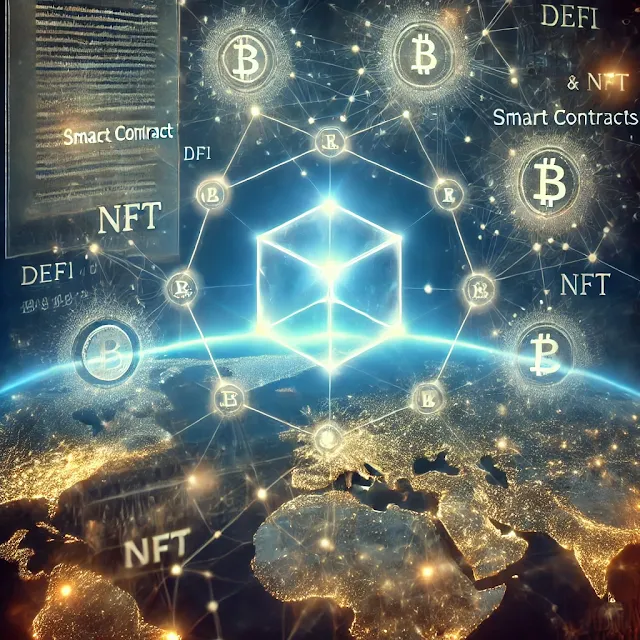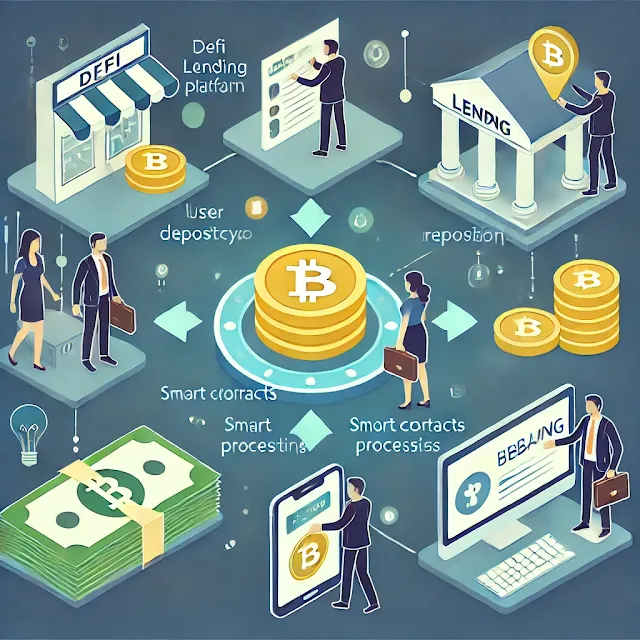Smart Contracts Explained: How They Power DeFi and NFTs
Introduction
Smart contracts are self-executing agreements written in code, running on blockchain networks like Ethereum. They eliminate the need for intermediaries, ensuring trustless and secure transactions. From DeFi (Decentralized Finance) to NFTs (Non-Fungible Tokens), smart contracts are reshaping the digital world. This guide explains how smart contracts work and their impact on the DeFi and NFT ecosystems.
What Are Smart Contracts? Understanding the Basics
How Do Smart Contracts Work?
Smart contracts are digital agreements stored on a blockchain. They execute automatically when predefined conditions are met. For example, a smart contract in a decentralized exchange (DEX) releases funds once both parties meet trading conditions.
Key Features of Smart Contracts
- Automation – Executes agreements without human intervention.
- Transparency – The code is publicly accessible on the blockchain.
- Security – Once deployed, smart contracts cannot be altered.
- Trustless – Eliminates the need for third parties.
How Smart Contracts Power DeFi
Revolutionizing Financial Services
DeFi leverages smart contracts to offer financial services without banks or intermediaries. Platforms like Uniswap, Aave, and Compound use smart contracts for lending, borrowing, and trading.
Examples of DeFi Applications Using Smart Contracts
- Decentralized Exchanges (DEXs): Smart contracts enable peer-to-peer trading without a central authority.
- Lending Protocols: Users can lend and borrow assets through automated contracts.
- Yield Farming & Staking: Investors earn rewards by locking assets in smart contract-based protocols.
Smart Contracts and NFTs: Enabling Digital Ownership
How NFTs Use Smart Contracts
NFTs are unique digital assets verified and managed by smart contracts. These contracts store metadata, ownership details, and royalty structures, making NFTs verifiable, transferable, and secure.
Popular NFT Marketplaces Using Smart Contracts
- OpenSea – Smart contracts power NFT auctions and transfers.
- Rarible – Enables artists to mint and sell NFTs autonomously.
- Foundation – Ensures transparent and fair creator royalties.
Benefits and Challenges of Smart Contracts
Advantages
- Efficiency: Eliminates paperwork and speeds up transactions.
- Cost Savings: Reduces fees associated with traditional financial systems.
- Immutability: Ensures that executed contracts cannot be tampered with.
Challenges
- Code Vulnerabilities: Bugs in smart contracts can lead to hacks.
- Regulatory Concerns: Governments struggle to regulate decentralized contracts.
- Scalability Issues: Networks like Ethereum face high gas fees due to congestion.
Future of Smart Contracts in Blockchain Technology
The Evolution of Smart Contracts
New blockchain platforms like Solana, Polkadot, and Avalanche aim to improve smart contract efficiency, speed, and scalability.
Potential Future Use Cases
- Legal Agreements: Automating business contracts.
- Real Estate Transactions: Tokenizing property ownership.
- Healthcare Data Sharing: Securing patient records on blockchain.
FAQs
What blockchain supports smart contracts?
Ethereum is the most popular blockchain for smart contracts, but others like Binance Smart Chain, Solana, and Cardano also support them.
Are smart contracts legally enforceable?
Smart contracts are self-executing but may not be legally binding in all jurisdictions. Their legal recognition varies across countries.
Can smart contracts be hacked?
Yes, poorly written smart contracts can have vulnerabilities, making them targets for exploits like the DAO hack of 2016.









No comments:
Post a Comment
I genuinely appreciate you taking the time to read this blog post. Your support, comments, and engagement mean so much to me. Whether you’re here for the first time or have been following along for a while, I’m grateful to have you as part of this journey.
If you found value in this post, please consider sharing it or leaving a comment—your feedback helps me create content that resonates with you. Thank you for being a part of this community!
Warm regards,
Daily Boost Guide